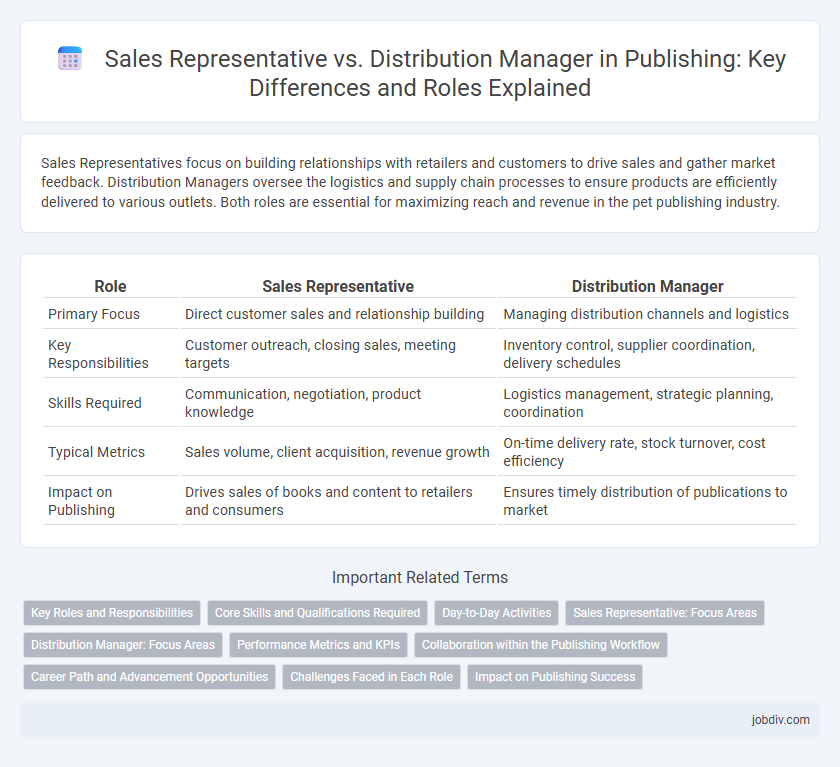Sales Representatives focus on building relationships with retailers and customers to drive sales and gather market feedback. Distribution Managers oversee the logistics and supply chain processes to ensure products are efficiently delivered to various outlets. Both roles are essential for maximizing reach and revenue in the pet publishing industry.
Table of Comparison
| Role | Sales Representative | Distribution Manager |
|---|---|---|
| Primary Focus | Direct customer sales and relationship building | Managing distribution channels and logistics |
| Key Responsibilities | Customer outreach, closing sales, meeting targets | Inventory control, supplier coordination, delivery schedules |
| Skills Required | Communication, negotiation, product knowledge | Logistics management, strategic planning, coordination |
| Typical Metrics | Sales volume, client acquisition, revenue growth | On-time delivery rate, stock turnover, cost efficiency |
| Impact on Publishing | Drives sales of books and content to retailers and consumers | Ensures timely distribution of publications to market |
Key Roles and Responsibilities
Sales Representatives in publishing primarily focus on direct client engagement, securing orders, and nurturing customer relationships to drive book sales. Distribution Managers oversee the logistics, inventory management, and coordination with warehouses and retailers to ensure timely and accurate delivery of publications. Both roles are critical for streamlining the supply chain and maximizing market reach in the book industry.
Core Skills and Qualifications Required
Sales Representatives in publishing require strong interpersonal communication, negotiation abilities, and an in-depth understanding of book markets and customer segmentation. Distribution Managers must have expertise in supply chain logistics, inventory management, and proficiency with distribution software to ensure efficient delivery of titles. Both roles benefit from analytical skills and industry knowledge, but Sales Representatives focus more on client relationship building, while Distribution Managers emphasize operational efficiency.
Day-to-Day Activities
Sales Representatives in publishing focus on direct client interactions, managing customer relationships, and securing book orders to drive revenue. Distribution Managers oversee the logistics of delivering books, coordinating with warehouses, managing inventory levels, and ensuring timely shipment to retailers and customers. Effective collaboration between these roles ensures a streamlined supply chain and maximizes market reach.
Sales Representative: Focus Areas
Sales Representatives in publishing concentrate on building strong client relationships, negotiating contracts, and driving book sales across diverse market segments. Their expertise lies in understanding customer needs, promoting new titles, and securing shelf space in retail chains and independent bookstores. Unlike Distribution Managers who focus on logistics and inventory management, Sales Representatives prioritize revenue growth through direct client engagement and strategic sales initiatives.
Distribution Manager: Focus Areas
Distribution Managers in publishing emphasize optimizing supply chain logistics, managing relationships with distributors, and ensuring timely delivery of books to retailers and customers. Their focus areas include inventory control, demand forecasting, and negotiating distribution agreements to maximize market reach and sales efficiency. Effective distribution management directly impacts book availability, customer satisfaction, and overall revenue growth in the publishing industry.
Performance Metrics and KPIs
Sales Representatives in publishing typically focus on KPIs such as sales volume, client acquisition rates, and revenue growth per territory, emphasizing direct customer interactions and deal closures. Distribution Managers prioritize metrics like inventory turnover, delivery accuracy, and distribution cost efficiency to optimize the supply chain and ensure timely book availability. Both roles rely on performance data to enhance market penetration and profitability but measure success through distinct operational lenses.
Collaboration within the Publishing Workflow
Sales Representatives drive direct engagement with retailers to maximize book sales and market penetration, while Distribution Managers oversee the logistics and supply chain efficiency to ensure timely delivery and inventory management. Effective collaboration between these roles streamlines the publishing workflow by aligning sales strategies with distribution capabilities, resulting in optimized stock levels and enhanced customer satisfaction. Integrating sales data with distribution planning supports demand forecasting and minimizes delays in the publishing supply chain.
Career Path and Advancement Opportunities
Sales Representatives in publishing typically begin by building direct client relationships and mastering product knowledge, which can lead to roles such as Senior Sales Executive or Regional Sales Manager. Distribution Managers oversee supply chain logistics and network optimization, often advancing to senior operational roles like Distribution Director or Supply Chain Vice President. Career advancement in publishing hinges on gaining expertise in sales strategies or distribution efficiencies, with potential cross-functional moves enhancing leadership prospects.
Challenges Faced in Each Role
Sales Representatives in publishing often face challenges such as meeting aggressive sales targets, navigating client objections, and maintaining relationships in a competitive market. Distribution Managers encounter logistical complexities like optimizing supply chains, managing inventory levels, and coordinating with multiple retail partners to ensure timely delivery. Both roles require strategic problem-solving skills but differ in focus: client engagement for Sales Representatives and operations efficiency for Distribution Managers.
Impact on Publishing Success
Sales Representatives directly engage with retailers and customers, driving immediate revenue through personalized sales strategies and market feedback. Distribution Managers optimize the supply chain, ensuring timely delivery and availability of publications, which enhances market reach and customer satisfaction. Their combined efforts significantly influence a publisher's market penetration, brand visibility, and overall revenue growth.
Sales Representative vs Distribution Manager Infographic

 jobdiv.com
jobdiv.com